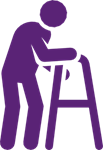 1. Issue
1. Issue
The manager of a large residential aged care facility has conducted an audit of residents' records, of those who have died over the past 12 months. She has noted that despite an expressed wish of 90% of residents to die at the facility, only 23% did.
The audit results are tabled at the facility monthly staff meeting. Feedback from staff including nursing, allied health and personal care staff indicates a lack of confidence in identifying clinical deterioration, coordinating and delivering care during transition to and during the terminal phase.
2. Using the Framework
The manager determines that focussed learning incorporating advance care planning and establishing goals of care will be used to improve staff confidence in this area of service provision.
She uses the Framework to identify the current skills and knowledge level of staff, determining that expertise varies considerably across the different staff groups i.e. registered nurses (RNs), allied health and personal care staff.
3. Relevant learning items
For RNs:
Models of care:
- 1.1.2. Contemporary palliative care
Ethics and decision-making:
- 1.4.1. Own beliefs and values and how these affect decision-making and influence practice
- 1.4.7. Interpreting and applying legislation in end-of-life care

Impeccable assessment:
- 2.1.6. Applying palliative care assessment during increasing decline and in the last days of life
Clinical management:
- 2.2.4. Care planning during increasing decline and last days of life including the Care Plan for the Dying Person
- 2.2.9. Rapid response to changing and escalating needs
Prevention and relief of suffering:
- 2.3.2. Preventing, recognising and responding to holistic suffering
Loss, grief and bereavement:
- 2.5.16. Providing bereavement services
4. Next steps…
The manager determines education and training for registered nurses to be a priority in the first instance.
Using the resources linked to the Framework, she identifies suitable training sessions accessed via the Palliative and Supportive Care Education (PaSCE) Service: Principles of Palliative Care, Modules 1 and 2.
The RNs will be involved in the development and delivery of future informal in-house education to allied health and personal care staff.